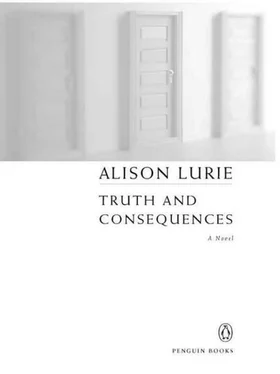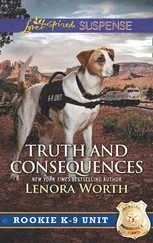TWENTY
It was a fine early June evening, with a soft salty breeze in the plumed pampas grass by the water, and the organic-food tycoon and art collector Franklin Bannerman was hosting a large drinks party on his Greenwich estate. The occasion, officially, was the completion of a brand-new ruined medieval tower on the shore, designed by the newly fashionable installation artist Alan Mackenzie. The tower itself was not actually ruined, though a few crenellations were missing from its battlements. But only a fragment of the adjoining walls remained—or, rather, had just been built—suggesting the ghostly presence of a much larger structure.
The stonemason and the two architecture graduate students who had helped Alan in the construction were on the terrace mingling with the guests, drinking and scarfing up salmon pâté and creamed chicken in puff pastry. But Alan, tired of walking back and forth, waited beside the warm gray stones of the tower, leaning on his cane, while people in groups of two or more crossed the long velvety lawn to see the structure more closely and ask questions about it, some intelligent and some ridiculous. Those of the men tended to be practical or ribald (“Took you how long to put up this thing?” “Well, Frank finally got himself a really big prick.”). Those of the women were more often sentimental or domestic (“Oh, it’s lovely, it makes me feel as if I was in a fairy tale” “You ought to put some lights in here, so Frank could use it for parties”).
Alan was beginning to think of returning to the terrace for another drink, but decided to give it a few more minutes. His back hurt, as usual, though the pain was somewhat blurred now by alcohol and codeine, and by a sense of professional triumph. Otherwise he felt and looked well: he had lost weight and picked up a tan from working on the tower, and he had a new expensive haircut and an even more expensive beige summer suit.
The last six months had been strange and confused, marked by both gains and losses. His career was going well: several more big drawings had been sold at what he still thought of as inflated prices; and there were two more commissions in prospect, one definite. He had a show scheduled in October at Jacky Herbert’s gallery, and there had been short but gratifying pieces about his installations in the New York Times and the Corinth Courier. On the other hand, he had lost both his wife and his true love, Delia Delaney.
When Delia left Corinth in December she had vanished almost completely, leaving no address or telephone number, only a PO box in Ashland, North Carolina. Alan had written to this box frequently, and received in reply only three warmly affectionate but very brief notes, the last one in March.
Wild snowdrops in the sunlit woods today, a message of new life and hope.Winds whispering secrets, songbirds calling and mating in the pines. My pen is in my hand—you are in my thoughts always.
Dilly
Since then, silence. Of course, Delia had warned him; she had explained that in order to work again—to make contact with her spirits, as she put it—she would have to cut herself off from everyone for a while, even from the people who meant most to her—perhaps especially from them, she had murmured, with a meaningful glance at Alan. But she had refused even to guess how long she might be gone, or when he might see her again. “Darling, I can’t know that now—I can’t know anything.”
Trying to reconcile himself to her temporary absence, Alan had frequently reminded himself of all Delia had given him already. It was because of her that he had a New York gallery and sales at New York prices. It was because of her that he had crawled out from under the heap of dirt and stones that his life had become, and dared to commit himself to art and to love. Delia had even persuaded him to see the clawing lizard in his back as not wholly evil. If he had remained free of it, he would also have remained merely a professor of architectural history, with an occasional hobby of building and drawing follies and ruins. She had changed his life—and he had hoped to change hers.
All through December and January he thought of Delia, his Dilly, almost constantly, remembering her voice, her touch, her words so vividly that at first he sometimes forgot that she was gone. As he walked down the hall at the Unger Center he would often automatically glance into her room, and only then remember that she had left. Meanwhile, her freeloader husband, Henry Hull, was already back in Corinth, living in their rented house. From time to time Alan saw him hanging around the Center office. It was clear that Delia had no further use for him—yet Henry, apparently not realizing this, or hiding his true feelings, maintained a cheerful manner. A couple of times, when Jane wasn’t around, Alan had stopped to ask him how Delia was doing, and the answer was always the same: “Fine, far as I know.” His tone was offhand, but no doubt he was feeling uneasy and rejected, and with good reason. You’re on your way out, pal, Alan thought. Whether you know it or not.
At home, Alan never mentioned Delia’s name; he tried to behave politely and pleasantly during this interim period. There was no point, after all, in making trouble for Jane before it had to be made. Then, one evening just before Christmas, his wife had declared that she wanted to move back into her parents’ house, after they left for their annual winter stay in an RV park in Tampa.
The thing was, she told him, she did not think their marriage was working. Though he disliked the idea of his or any marriage as a malfunctioning appliance, Alan could not disagree; he knew that in effect Jane was right. They had been happy together once, but the person who had been happy with Jane and with whom she had been happy was someone else, someone healthier and more conventional—not an invalid and not an artist. Besides, when Delia returned it would be easier if he was living alone.
This time Jane did not bring him a dinner wrapped in foil every day, but she arranged for their cleaning lady to come in three afternoons a week instead of one, to do the laundry, shopping, and errands, and leave a meal for Alan to warm up. Jane also provided him with the take-away menus of several local restaurants. Thanks to the checks that kept coming from the gallery, he could easily afford the extra expense.
He missed her, in a way, but it was also a relief that she was not there every evening serving his dinner and doing the dishes and then sitting alone in the living room switching channels on the TV and hoping that their marriage, that ill-functioning stove or fridge, would recover by itself, when he already knew it would not recover—that what was wrong with it was fatal.
It was a hard, lonely winter. January and February were cold and gray, and Alan was often in pain or blurry from the effects of drugs with threatening names that sounded like diseases. Sometimes he was well enough to draw and paint, or make notes for his study of church architecture, which he had not quite abandoned. At other times he spent whole afternoons lying on the sofa in his office, trying to read a heavy book held awkwardly and painfully on his chest, or listening to tapes of classical music. Over and over again he kept telling himself that one day, after the snow melted, Delia would be there.
Often he imagined this time: their meeting, their walks in the greening woods or in the Corinth Orchard; Dilly in his bed, or bedded among the falling apple blossoms. He even imagined the trouble-free end of his marriage, and of Delia’s, and a summer wedding at her cabin in the North Carolina mountains—or perhaps here in Corinth, in the ruined chapel he and his students had built—its stained-glass window of holy chickens now in place. He imagined Delia crowned with flowers whose names and meanings she would know, and their procession through the miniature triumphal arch that had been the first step toward his new career. He was pleased and encouraged when he received a formal request from Delia’s publisher asking for the right to use a reproduction of his drawing for Attic Window on the cover of her forthcoming book. It proved that, though she might be silent, Delia was indeed thinking of him.
Читать дальше







![Кэмерон Доки - Правда и ее последствия[Truth and Consequences]](/books/79610/kemeron-doki-pravda-i-ee-posledstviya-truth-and-con-thumb.webp)




